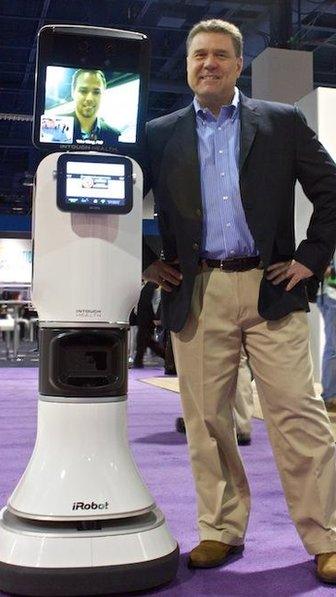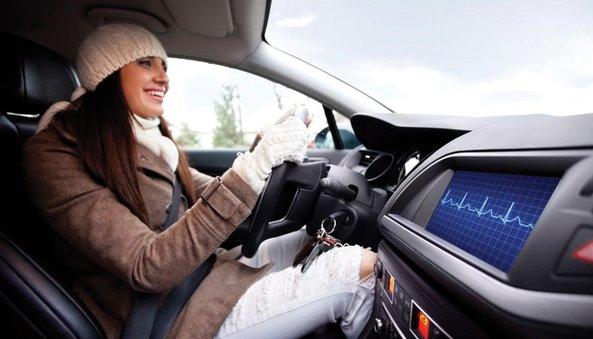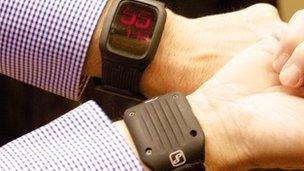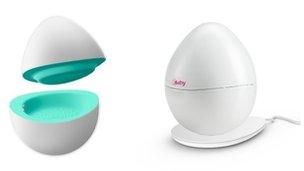CES 2013: Health and safety technology booms
- Published
Health tech grabs attention at CES
From cheap throwaway sensors to big ticket devices targeted at medical professionals, this year's Consumer Electronics Show (CES) has featured more health and wellbeing tech than ever before.
The RP-Vita (Remote Presence Virtual and Independent Telemedicine Assistant) is one of the more advanced items on display.
The person-sized robot is designed to glide round hospital corridors allowing consultants to drop in on patients in different buildings to their own. Its built-in stethoscope and other equipment can be operated by a nurse to provide the physician with live readings, and a screen and camera on top allows the doctor and patient to have face-to-face video conference conversations.
It's a big investment for hospitals to make, but the firm behind it says that patients act differently than they would if called over a phone or tablet computer.

Mr Beck says the first robots will ship for use in hospitals by March
"It's interesting to watch patients deal with it," says Jeff Beck, chief operating officer of iRobot.
"They almost talk to it like it is a person, because the doctor's face will be on the screen and you also have the physicality of the torso."
His firm is best known for its vacuum cleaning robots. When it decided to branch out, healthcare was an obvious choice.
A recent study suggested the US, external alone spent more than $1.6 trillion (£1tn) on the sector in 2010.
"As a for-profit business that's an attractive pond to go swimming in," says Mr Beck.
Active children
At the other end of the scale are small gadgets packed with sensors used to track their owner's activity levels.
South Korea's LG is among the latest to join the market with its Smart Activity Tracker - a bracelet device which resembles Nike's bestselling Fuelband.
Fitbit, which helped pioneer this kind of wearable tech, is also back with Flex, which distinguishes itself by letting users swap its sensor unit from one wristband to another to co-ordinate with their clothes.
Geopalz's spin on the format is perhaps more noteworthy.
Its new iBitz Powerkey tracker is targeted at children, who are encouraged to exercise in order to care for a virtual pet on an associated smartphone app. The more steps they take, the more lively the character becomes.
It has also created a software kit so other developers can release alternative exercise-driven games.
.jpg)
Geopalz's sensors are designed to be placed on one of a child's hips or shoes
Its founder says such innovations are needed to tackle rising levels of child obesity.
"We're losing our kids to devices," says Zan O'Leary.
"They want to play their games all day long and they're not running around like they used to. So we're trying to retrain them to be physically active and make it fun."
Dance trackers
The "gamification" of exercise is also being explored by one of the US's biggest health insurance providers.
UnitedHealth Group has teamed up with Japanese games developer Konami to release a version of DanceDanceRevolution customised for school PE lessons.
Up to 48 children play the game by dancing on wireless mat controllers, matching their actions to commands given on a monitor.
Each mat gathers information, including the number of steps taken and the child's body mass index.
"Each pad is equipped with a smartcard that is assigned to each student," says the insurer's games producer, Arrianne Hoyland.
"It collects their data as they are playing so the teacher can see across their classroom who is really into it, and can then share the information with their parents to help get everyone involved."
At $26,000 (£16,220) for the full 48-piece set, it will be beyond many schools' budgets as well as raising several privacy issues.
'Life savers'

Anti-sleep detectors for cars and other health and safety tech from CES
Other tech on show was focused on protecting users's health from more immediate risks.
Masimo - a manufacturer whose devices are sold to hospitals - is targeting hikers and pilots with its iSp02 finger clip sensor.
It measures a user's pulse and blood oxygen levels, and can be used to diagnose altitude sickness and hypoxia - a lack of oxygen to the brain that can occur in unpressurised small planes causing the victim to act as if drunk.
While the sensor itself is nothing new, what makes the kit stand out is that it attaches to a smartphone rather than featuring its own display. This makes it easier for users to track their results over time.
Another example of accident-prevention kit came from UK company Plessey.

The Perpetua team have been able to keep a digital watch charged by adding their kit to its wristband
It has developed sensors designed to be built into car seats that can detect the users' vital signs through their clothes. Several vehicle manufacturers are already testing them with a view to being able to detect if a driver is falling asleep at the wheel.
"Your heart beat interval changes as you get tired and this is all about detecting those changes," says Steve Cliffe, the firm's business development director.
"And so the car can say there is a problem and engage lane departure technology that already exists and adaptive cruise control to make sure you don't hit the guy in front, and try and wake you up or stop the car - though that's not legal yet."
Baby beats
Much of the health tech on show at CES has not been certified by regulators and maybe never will.
Consumers must therefore be cautious about some of the claims made.
Some of exhibitors are happy to admit that some suggested benefits can't be verified.
The iBaby HeartSense is a case in point.
The pebble-shaped gadget allows pregnant mothers to amplify the sound of a baby's heartbeat allowing it to be recorded as an MP3 file.

iHealth acknowledges music from its device may not help an unborn baby
In addition it can play music to the child in their womb.
"You can play Mozart to your baby or give them French lessons," says iHealth device designer Uwe Diegel, adding that he has taken care to restrict the volume to meet safety guidelines.
"I'm sure you've read studies that say if you play classical music to plants they are happier.
"It's a soft kind of science that nobody can disprove - but, all we know is that it can't do any harm."